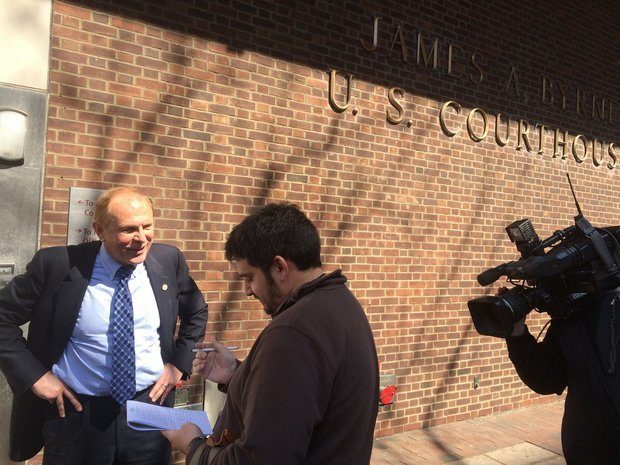
The New Jersey sports betting case goes back to court on Wednesday, but this time instead of three Third Circuit judges there will be 12, as is pursuant to the special “en banc” appeal hearing stipulations.
Soon after voters favored a referendum to allow sports betting in 2011, the so-called “Big Four” of sports, the NFL, MLB, NBA and NHL, along with the NCAA, filed suit against New Jersey. The lawsuit specifically named Governor Chris Christie (R), Division of Gaming Enforcement David Rebuck, New Jersey Racing Commission Executive Director Frank Zanzuccki, State Senate President Stephen Sweeney (D), and Speaker of the Assembly Vincent Prieto (D).
The Big Four and NCAA argue New Jersey’s decision to legalize sports betting violates the Professional and Amateur Sports Protection Act of 1992 (PASPA). The longstanding bill prohibits sports betting with the exception of Nevada, as it was grandfathered in when the legislation was passed.
After two three-judge rulings blocked New Jersey from opening sports betting at its casinos and racetracks, the United States Court of Appeals for the Third District in Philadelphia granted a rare “en banc” hearing that was largely considered a big win for the state. Just a small fraction of motions to en banc are approved each year.
This week, attorneys representing Christie, the Thoroughbred Horsemen’s Association, and the state Legislature will each have 30 minutes to argue their case to the bench.
Should the judges rule at minimum 7-5 in favor of New Jersey, all previous rulings will be annulled. However, a 6-6 tie or worse reinstates the decision that New Jersey’s wishes to legalize sports betting violates federal law.
Not So Fast
Unfortunately for New Jerseyans looking to finally put some money on the New Jersey Devils, New York Jets and Mets, Brooklyn Nets and Rutgers football (okay, maybe it’s best sports betting remains illegal), the Third District isn’t expected to produce its ruling on Wednesday as en banc verdicts can take upwards of six months.
However, the media attention state and nationwide could expedite the process by imposing additional pressure on the judges to come to a conclusion.
State Senator Ray Lesniak (D-District 20), New Jersey’s most active gaming proponent, remains optimistic.
“We’ll have sports betting. Sports betting will attract folks who will stay for long weekends, Super Bowl weekends, any big event,” Lesniak said recently. “Not only will they stay, they’ll dine, they’ll rent rooms, they’ll have parties. That’s the attraction of sports betting.”
When Lesniak’s anticipated vision will come to a reality remains unknown.
Domino Effect
Sports betting in the United States is big business. The American Gaming Association estimates that $138.9 billion was wagered illegally in the US last year alone.
That makes the rogue sports betting more robust than the oil smuggling, human trafficking and wildlife trafficking, and the cigarette bootlegging black markets combined.
Drug trafficking worldwide accounts for an estimated $320 billion in revenues for cartels, meaning the criminal global sports betting industry isn’t too far behind.
Legalizing the market would not only protect consumers, but also disrupt organized crime syndicates running the gambling rings. Should New Jersey win its case, additional states will likely follow.
“It comes down to whether the court finds the partial repeal … violates PASPA,” attorney Kevin Braig told ESPN. “Or, if the court takes one more step to find that New Jersey’s sovereign right to strike laws from its books that it no longer finds desirable is beyond the federal government’s reach.”









